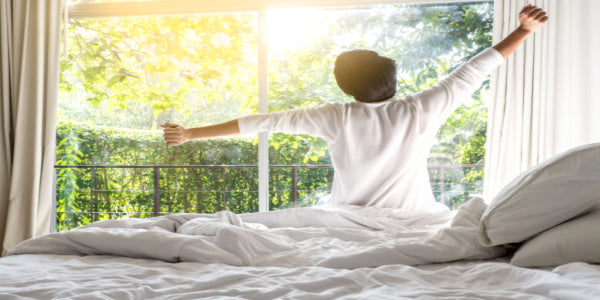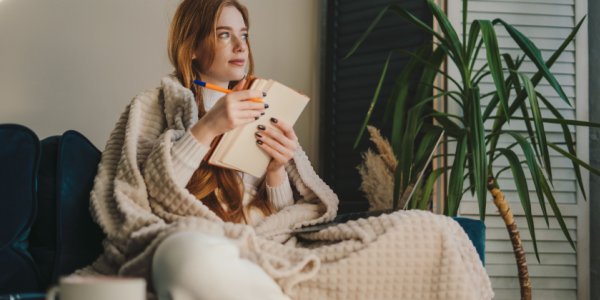
Are you looking for more energy in the morning when you get up? If yes, know you are not alone. According to the CDC, one in three American adults does not get enough sleep on a regular basis which leaves many Americans looking for a daily morning energy boost.
While caffeine is a popular go-to for a morning pick me up, many other methods can be used to get energy in the morning whether you drink coffee or not. Following consistent habits during the day and before bed can lead to naturally feeling more energized when you wake up.
So, if you are tired of waking up tired, do not sleep on these top tips for how to get more energy in the morning!
Top 10 Morning Energy Boosts to Supercharge Your Day
If you consistently wake up feeling tired and groggy, these tips can help you get energy in the morning (and the rest of the day)! Focus not only on things to do in the morning but throughout the day and into the night for a consistent shift in morning energy levels over time.
1. Follow a Consistent Bedtime Routine
The Sleep Foundation recommends following a set bedtime routine to help program the mind and body to prepare for sleep. Follow the same steps at night like changing into pajamas, brushing teeth, and reading.
Staying consistent with a bedtime routine can help shift your energy levels in the morning, including for the better!
2. Reduce Screen Time Before Sleeping
The blue light from screens interferes with how we can fall and stay asleep. Blue light can lower the amount of melatonin the body produces and dull natural feelings of sleepiness.
Make part of your bedtime routine unplugging from all electronics at least 30 minutes before falling asleep.
Limiting screen time will help promote quality sleep at night which can help you feel more refreshed in the morning.
3. Avoid Hitting the Snooze Button
It seems counterintuitive and the last thing you would want to do. But instead of hitting the snooze button on the alarm in the morning, get up when the alarm first goes off.
Falling back asleep for 5 to 10 minutes after the initial alarm will actually make you feel MORE tired. This is because the body is waking up again when not in a deep part of the sleep cycle.
This feeling of battling the internal alarm clock is also just not a pleasant way to start the day! Getting up before "battling" the alarm clock helps start the day in a more positive mental state.
4. Use Natural Light to Set Wake and Sleep Patterns
Eyes, even when closed, have natural light receptors. The light coming through the window or using a natural light "alarm" can help one rise earlier and even feel more well-rested.
The same goes for at night, dim the lights and fall asleep in a dark environment. This is one reason why looking at screens interferes with falling asleep which carries over to feeling groggy in the morning.
5. Start the Day with Movement
When you first wake up out of bed, muscles have had a very limited movement for many hours. Moving your body in the morning, whether a gentle yoga, walk, run, or workout, can help boost energy levels both physically and mentally. Moving can also set the tone for the day with high energy and health at the top of your mind.
Tips and tricks for early morning workout motivation can include:
• Setting out workout clothes the night before
• Meeting someone to exercise with
• Keeping movement realistic to what is doable and achievable
6. Drink Water Right Away in the Morning (and throughout the day)
Since very little if any water is consumed throughout the night, the body is slightly already dehydrated when you wake up in the morning. Being even slightly dehydrated can increase feelings of tiredness and lethargy.
Focusing on drinking more water in the morning may be just the trick to boosting energy levels first thing. Ways to hydrate in the morning include drinking a glass of water while brewing coffee or taking any vitamin, medication, etc. Having a glass of water at the bedside can also encourage more water intake right away.
If you want something warm, drink herbal tea or hot water with squeezed lemon and ginger slices for a way to get energy in the morning without caffeine.
7. Eat a Nourishing Breakfast
The controversy remains whether or not breakfast is considered the most important meal of the day. However, eating a healthy breakfast can help you feel energized in the morning and can be a natural, simple way to boost energy.
Keep in mind it is important to steer away from high-calorie, high-sugar breakfasts for energy. Pastries, donuts, and other sugary items may lead to energy spikes but may cause rapid drops in energy.
Focus on eating a nutritious, high-protein breakfast with a pack of fiber and/or healthy fat such as:
• A high-protein smoothie
• Overnight oats
• Greek yogurt parfait
• Veggie-packed omelet
The balance of nutrients can stabilize blood sugar and hunger, all while maximizing energy levels to kick off the day!
8. Get Outside During the Day
The natural light/dark cycle of sunlight and darkness helps promote healthy sleep patterns. When we are not exposed to natural sunlight during the day, and are exposed to blue light at night, the circadian rhythm can get off. Unfortunately, most Americans spend most of the day inside working, going to school, or at home.
In addition to limiting blue light at night, make sure to get outside (even if the sun is not out) in natural daylight. Natural light exposure can help promote healthy sleep at night and lead to an energetic, productive morning.
9. Don’t Overdue the Caffeine
Harvard Health suggests drinking coffee or having caffeine in moderation is associated with some health benefits, but keep in mind more is not always simply better for health. If you feel low energy in the morning, it may be tempting to pile on the caffeine.
However, overdosing on caffeine in the morning could cause you to feel more lethargic later, leading to a cycle of caffeine spiking and crashing energy levels. Some may experience unpleasant side effects like feeling jittery or a racing heart even from a moderate amount of caffeine.
Generally, three to five cups of coffee per day is considered safe for most people. However, there is a wide variance in individual sensitivity.
If you consume too much caffeine, consider switching some or all caffeinated beverages to tea or other lower caffeine drinks in the morning for sustained energy.
10. Check with a Doctor
If you are chronically waking up feeling tired, even with healthy sleep hygiene practices, check-in with a doctor. Underlying health issues and sleep disorders may be impacting your energy and sleep, including chronic fatigue syndrome, restless leg syndrome, and sleep apnea.
A doctor can help pinpoint the root of the cause regarding why you are always waking up tired.
Identifying the reason allows for targeted tests, interventions, and recommendations as needed.
In Summary: How to Get Energy in the Morning
Besides turning to excessive caffeine, there are natural ways to boost energy in the morning that do not lead to a consequential energy crash. Morning energy can require not only shifts in morning habits but also throughout the day and night.
Get into a consistent bedtime routine including limiting screen time before bed. Throughout the day get into the practice of enjoying natural sunlight and in the evening use the dimming of natural lighting to signal healthy sleep patterns.
In the morning, avoid the temptation to keep hitting the snooze button. Instead, move your body first thing, hydrate, and eat a nourishing breakfast to boost energy levels.
Lastly, if these shifts do not help boost morning energy levels, or you suspect an underlying health condition, consult your doctor to further target solutions for healthy energy levels.
References:
1 in 3 adults don't get enough sleep. Centers for Disease Control and Prevention. Published February 16, 2016. https://www.cdc.gov/media/releases/2016/p0215-enough-sleep.html.
How Electronic Affect Sleep. Sleep Foundation. https://www.sleepfoundation.org/how-sleep-works/how-electronics-affect-sleep.
Shmerling RH. The latest scoop on the health benefits of coffee. Harvard Health. Published September 25, 2017. https://www.health.harvard.edu/blog/the-latest-scoop-on-the-health-benefits-of-coffee-2017092512429.
What Is Sleep Hygiene? Sleep Foundation. https://www.sleepfoundation.org/articles/sleep-hygiene.





